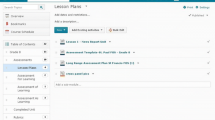ABSTRACT
INTRODUCTION
The hidden (informal) curriculum is blamed for its negative effects on students’ humanism and professional development. To combat this, educational initiatives employing mentored reflective practice, faculty role-modeling, and feedback have been advocated.
AIM
Promote reflection on professional development using collaborative, web-based technology.
SETTING
Four-week basic medicine clerkship rotation at an academic institution over a one-year period.
PROGRAM DESCRIPTION
Students were asked to contribute two reflective postings to a class web log (blog) during their rotation. They were able to read each other’s postings and leave feedback in a comment section. An instructor provided feedback on entries, aimed to stimulate further reflection. Students could choose anonymous names if desired.
PROGRAM EVALUATION
Ninety-one students wrote 177 posts. One-third of students left feedback comments. The majority of students enjoyed the activity and found the instructor’s feedback helpful. Assessment of the posts revealed reflections on experience, heavily concerned with behavior and affect. A minority were not reflective. In some cases, the instructor’s feedback stimulated additional reflection. Certain posts provided insight to the hidden curriculum.
DISCUSSION
We have discovered that blogs can promote reflection, uncover elements of the hidden curriculum, and provide opportunities to promote professional development.
Similar content being viewed by others
References
Project Professionalism. Professionalism in medicine: issues and opportunities in the educational environment. Philadelphia, PA: American Board of Internal Medicine; 1995.
Inui TS. A Flag in the Wind: Educating for Professionalism in Medicine. Washington, DC: Association of American Medical Colleges; 2003.
Novack DH, Volk G, Drossman D, Lipkin M. Medical interviewing and interpersonal skills teaching in US medical schools: progress, problems, and promise. JAMA. 1993;296:2101–5.
Kern DE, Branch WT, Jackson JL, Brady DW, Feldman MD, Levinson W, Lipkin M. Teaching the psychosocial aspects of care in the clinical setting: practical recommendations. Acad Med. 2005;80:8–20.
Hafferty FW, Franks R. The hidden curriculum, ethics teaching, and the structure of medical education. Acad Med. 1994;69:861–71.
Conrad P. Learning to doctor: reflections on recent accounts of the medical school years. J Health Soc Behav. 1988;29:323–32.
Branch W. Supporting the moral development of medical students. J Gen Intern Med. 2000;15:503–8.
Wear D, Zarconi J. Can compassion be taught? Let’s ask our students. J Gen Intern Med. 2008;23:948–53.
Kopelman L. Cynicism among medical students. JAMA. 1983;250:2006–10.
Coulehan J. Viewpoint: today’s professionalism: engaging the mind but not the heart. Acad Med. 2005;80:892–8.
Wear D, Castellani B. The development of professionalism: curriculum matters. Acad Med. 2000;75:602–11.
Schon DA. Educating the Reflective Practitioner: Toward a New Design for Teaching and Learning in the Professions. San Francisco: Jossey-Bass; 1987.
Boud D, Keogh R, Walker D. Reflection: Turning Experience into Learning. London: Kegan Page; 1985.
Boyd EM, Fales AW. Reflective learning: key to learning from experience. J Humanistic Psych. 1983;23:99–117.
Charon R. Narrative medicine: A model for empathy, reflection, profession and trust. JAMA. 2001;286:1897–1902.
Dasgupta S, Charon R. Personal illness narratives: using reflective writing to teach empathy. Acad Med. 2004;79:351–56.
Fischer MA, Harrell HE, Haley H, Cifu AS, Alper EJ, Johnson KM, Hatem D. Between two worlds: A multi-institutional qualitative analysis of students’ reflections on joining the medical profession. J Gen Intern Med. 2008;23:958–63.
Kalet AL, Sanger J, Chase J, Keller A, Schwartz MD, Fishman ML, Garfall AL, Kitay A. Promoting professionalism through an online professional development portfolio: successes, joys, and frustrations. Acad Med. 2007;82:1065–72.
Whitcomb M. The information technology age is dawning for medical education. Acad Med. 2003;78:247–8.
Ruiz JG, Mintzer MJ, Leipzig RM. The impact of e-learning in medical education. Acad Med. 2006;81:207–12.
Kessler PD, Lund CH. Reflective journaling: developing an online journal for distance education. Nurse Educator. 2004;29:20–4.
Mezirow J. A critical theory of adult learning and education. Adult Education. 1991;32:3–24.
Moustakas C. Phenomenological Research Methods. Thousand Oaks: Sage; 1994.
Lagu T, Kaufman EJ, Asch DA, Armstrong K. Content of weblogs written by health professionals. J Gen Intern Med. 2008;23:1642–6.
Acknowledgements
We are indebted to the 91 student bloggers.
This research was not funded.
Conflict of Interest
None disclosed.
Author information
Authors and Affiliations
Corresponding author
Rights and permissions
About this article
Cite this article
Chretien, K., Goldman, E. & Faselis, C. The Reflective Writing Class Blog: Using Technology to Promote Reflection and Professional Development. J GEN INTERN MED 23, 2066–2070 (2008). https://doi.org/10.1007/s11606-008-0796-5
Received:
Revised:
Accepted:
Published:
Issue Date:
DOI: https://doi.org/10.1007/s11606-008-0796-5




